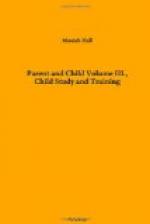2. Discuss the “won’t” child.
3. Discuss the “don’t” boy.
4. Discuss scolding and finding fault versus judicious praise.
5. What is the value of suggestion in guiding children? Illustrate.
6. What often explains disrespect and impudence in children?
8. Illustrate some helpful ways that give positive training to children.
Selections from “The Dawn of Character,” by Mumford, will be found helpful, for further studies on this subject.
FOOD, DRESS AND TOYS
“The Body Is More Than Raiment; and Life, More Than Meat.”
The normal child is born in a state of naturalness with respect to his tastes and appetites and the endeavor should be to keep him in this natural state. But too often his senses are stimulated to excess and an artificial appetite is begun which usually leads to some form of intemperance. Much of the excess in drinking is due, not to inheritance, but to vicious feeding. A false appetite leads to physical unrest and uneasiness and this naturally lends itself to the pleasure and excitement of drink.
“Why do you not eat the pickles, my son?” said one father; “they are very nice.” “No,” said the boy, “I don’t see any use in eating spiced pickles, it doesn’t help to make me strong; my teacher says so.” Would that every child were thus trained to prefer wholesome to unwholesome food. Our schools are doing good work along these lines of personal hygiene; parents should reinforce the efforts of the teacher by bringing the home hygiene up to the right standards.
The clothing of children also deserves some attention. Probably in nothing else is vanity and selfishness more easily displayed than in dress. How rare a thing it is to find a beautiful child, simply or even plainly dressed, who is neither vain of her good looks nor of her rich apparel. The sweetest object in the world is a beautiful child, tastily dressed, free from vanity, and perfectly natural and unspoiled. The mother who praises her child’s curls or rosy cheeks rather than the child’s actions or inner motives, is developing vanity of the worst kind—placing beauty of appearance above beauty of conduct.
“Fashionable parties for children are abominations upon the face of the earth.” Soon enough the child will come in contact with that which is unnatural and deceitful without having artificial conduct forced upon him.
LESSON XIV
QUESTIONS FOR DISCUSSION
1. What may result from developing an artificial appetite in children?
2. What should the young mother avoid in feeding her child?
3. What evils result from over-indulgence in candy, nick-nacks, soda water, etc.?
4. In the dress of children how is vanity often developed?
5. What may result from constant praise of the good looks of the child?




